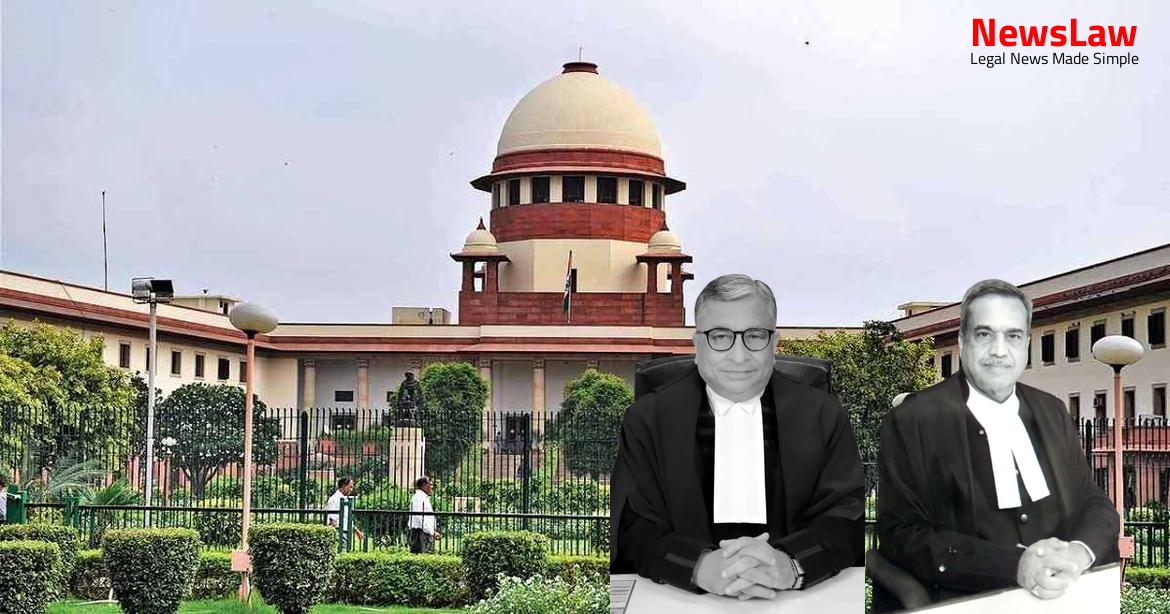In a recent landmark judgement, the Supreme Court of India addressed the dispute regarding the appointment of an arbitrator in a contract case involving Clauses 64(3)(a)(ii) and 64(3)(b). The case revolves around the arbitration demand by the respondent and the petitioner’s contention against the appointment of an independent arbitrator. Stay tuned for a comprehensive analysis of the court’s decision and its impact on contract law.
Facts
- Appellant issued notices to respondent for lack of progress in work.
- Contract was terminated by the appellant as per Clause 62 of the General Conditions of Contract.
- Appellant sent a list of serving Railway Electrification Officers to act as arbitrators.
- Respondent requested appointment of an Arbitral Tribunal for disputes and claims settlement.
- Modified Clause 64 stipulated composition of Arbitral Tribunal.
- Appellant awarded work contract of Rs.165,67,98,570/- to the respondent.
- Respondent filed Petition No.760 of 2017 challenging contract termination, dismissed by High Court.
- Appellant communicated another panel of retired Railway officers for selection of arbitrators by respondent.
- High Court directed the Arbitrator to proceed with the arbitration proceedings after noting their consent.
- Appeals filed against the orders dated 03.01.2019 and 29.03.2019 of the High Court.
- The High Court rejected the appellant’s contention regarding the appointment of the arbitrator as per the General Conditions of Contract and appointed Shri Justice Rajesh Dayal Khare as the sole arbitrator.
- The High Court dismissed the argument that the arbitrator should be selected only from the panel of arbitrators specified in the contract.
- Shri Rajesh Dayal Khare, a retired judge of the Allahabad High Court, was appointed as the sole arbitrator subject to his consent under Section 11(8) of the Arbitration and Conciliation Act.
- The High Court emphasized that its powers to appoint an arbitrator are independent of the contract and cannot be restricted.
Also Read: Judgment Review: Supreme Court’s Ruling on the Capital Punishment Appeal
Issue
- The issue at hand is whether the High Court’s decision to appoint an independent arbitrator goes against Clauses 64(3)(a)(ii) and 64(3)(b) of the General Conditions of Contract.
- The specific clauses restrict the appointment of an independent arbitrator in such cases.
Also Read: Judgment on Service of Summons and Authenticity of Power of Attorney
Arguments
- The petitioner argued that the General Manager is ineligible to be appointed as an arbitrator under Section 12(5) of the Act.
- The petitioner contended that the appointment of an independent arbitrator is in violation of the General Conditions of Contract.
- The petitioner argued for the appointment of arbitrators as per Clause 64(3)(b) of the General Conditions of Contract.
- Reference was made to past judgments such as Voestalpine Schienen Gmbh v. Delhi Metro Rail Corporation Limited.
- The petitioner highlighted the de facto inability of an arbitrator to act as such under Section 12(5) of the Act.
- The petitioner referred to the statutory ineligibility of all present or past employees for appointment as arbitrators.
- The petitioner emphasized the request for arbitration made by the respondent, which was not acted upon within the specified timeframe.
- Supporting judgments like Punj Lloyd Ltd. v. Petronet MHB Ltd. and others were mentioned in the arguments.
- The petitioner’s stand on the applicability of the Amended Act of 2015 in relation to the arbitration demand was presented.
- The petitioner contended that the panel of arbitrators proposed by the Appellant were ineligible as they were serving or retired employees of the Appellant.
- In the case of TRF Limited v. Energo Engineering Projects Limited, the Supreme Court emphasized appointment of arbitrators in accordance with the agreement terms.
- The appointment of an independent sole arbitrator was considered to be in violation of the General Conditions of Contract governing the parties.
Also Read: Balaji v. Nargolkar: Auction Sale Set Aside
Analysis
- Clause 64(3)(a)(i) specifies the appointment of a sole arbitrator within 60 days of a valid arbitration demand.
- The ineligibility of an arbitrator can only be removed by parties waiving the applicability of Section 12(5) through a written agreement.
- A person falling within the Seventh Schedule categories is legally ineligible to be appointed as an arbitrator.
- The Arbitral Tribunal in Clause 64(3)(b) consists of three retired railway officers not below Senior Administrative Officer rank.
- Parties can waive the ineligibility criteria by express agreement in writing, even after disputes arise.
- A modification to Clause 64 allows for a Gazetted Railway Officer to be appointed as a sole arbitrator if claims are under one crore rupees.
- The appointment of the Arbitral Tribunal follows a specific procedure outlined in the General Conditions of Contract (GCC).
- The General Manager retains the power to appoint arbitrators despite becoming ineligible to act as one by law.
- The General Manager must appoint at least one arbitrator from the panel suggested by the contractor, ensuring procedural compliance.
- The High Court’s appointment of an independent sole arbitrator without following the prescribed procedure under Clause 64(3)(b) of the General Conditions of Contract is deemed unjustified.
- The power balance in the arbitration process is maintained by allowing the respondent to select two arbitrators from a panel provided by the General Manager.
- The General Manager’s authority to nominate an arbitrator is affected if the nominated person becomes ineligible by law.
- The right of the General Manager to constitute an Arbitral Tribunal is retained, regardless of the application filed under Section 11(6) of the Arbitration and Conciliation Act.
- The value of the work contract determines the necessity for a panel of three arbitrators, as specified in the clauses of the General Conditions of Contract.
- The interest and bias of an arbitrator in the dispute outcome are critical considerations in the appointment process.
- The procedure and eligibility of arbitrators must align with the norms set forth under the Act and the Contract’s General Conditions.
- The arbitration process must be completed within the specified timeframes and with due consideration to the guidelines provided.
- The Respondent expressed disagreement in waiving off the applicability of Section 12(5) of the Amendment Act, 2015.
- The Appellant nominated a panel of four retired railway officers to act as arbitrators and requested the Respondent to select any two names within thirty days.
- The Respondent failed to select any nominee from the panel within the stipulated time.
- The Respondent approached the High Court for appointment of an independent sole arbitrator.
- The contention of the Respondent was that the panel proposed by the Appellant consisted of retired railway employees who were statutorily ineligible to be appointed as arbitrators.
- The Respondent sought for the appointment of a sole arbitrator as per the Tender Agreement/Clause 64 of the General Conditions of Contract.
- The Supreme Court in various cases such as Union of India v. Parmar Construction Company and Union of India v. Bharat Battery Manufacturing Co. emphasized the appointment of arbitrators as per the contract clauses.
- The Supreme Court emphasized that the right to appoint an arbitrator under the contract ceases once a party files an application under Section 11(6) seeking appointment of an arbitrator.
- The Supreme Court highlighted that if there is a clause requiring parties to nominate arbitrators, their authority to nominate cannot be questioned.
- The Supreme Court reiterated that appointments should be in terms of the agreement and courts should not appoint independent arbitrators ignoring contract clauses.
- The Supreme Court clarified that retired railway officers can be appointed as arbitrators and their expertise is valuable for technical dispute resolution.
- The failure of the Respondent to act within thirty days does not forfeit the Appellant’s right to appoint an arbitrator.
- The Supreme Court emphasized that bias cannot be attributed to retired employees acting as arbitrators.
- The Supreme Court noted that a retired employee of a party to the agreement can be appointed as an arbitrator without any statutory ineligibility.
- The appointment of retired railway officers as arbitrators aims to ensure technical aspects are effectively resolved.
- The contention of the respondent is considered to be lacking merit.
- The court does not find validity in the opposing argument presented.
- The judgement upholds the decision without credence to the contrary contention.
Decision
- The High Court’s decision to appoint an independent sole arbitrator was not justified as per the clauses 64(3)(a)(ii) and 64(3)(b) of the General Conditions of Contract.
- The impugned orders dated 03.01.2019 and 29.03.2019 were set aside.
- Appellant directed to send a panel of four retired officers within 30 days.
- Respondent-contractor to select two arbitrators from the panel within 30 days.
- Appellant to constitute the Arbitral Tribunal based on respondent’s selection within 30 days.
- Costs to be borne by parties individually.
- The agreement specified a panel of three Gazetted Railway Officers and three retired Railway Officers for the Arbitral Tribunal.
- The appointment of arbitrators should align with the agreement terms agreed upon by the parties.
Case Title: CENTRAL ORGANISATION FOR RAILWAY ELECTRIFICATION Vs. M/S ECI SPIC SMO MCML (JV) A JOINT VENTURE COMPANY
Case Number: C.A. No.-009486-009487 / 2019



